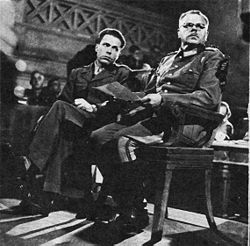This article needs additional citations for verification. (February 2013) |
Albert Otto Hirschman | |
|---|---|
 Hirschman (left) interpreting for the accused German Anton Dostler in Italy 1945 | |
| Born | April 7, 1915 |
| Died | December 10, 2012 (aged 97) |
| Academic career | |
| Field | Political economy |
| Institutions | |
| Alma mater | University of Trieste London School of Economics University of Paris HEC Paris |
| Contributions | Hiding hand principle |
| Information at IDEAS / RePEc | |
Albert Otto Hirschman[1] (born Otto-Albert Hirschmann; April 7, 1915 – December 10, 2012) was a German economist and the author of several books on political economy and political ideology. His first major contribution was in the area of development economics.[2] Here he emphasized the need for unbalanced growth. He argued that disequilibria should be encouraged to stimulate growth and help mobilize resources, because developing countries are short of decision-making skills. Key to this was encouraging industries with many linkages to other firms.
His later work was in political economy and there he advanced two schemata. The first describes the three basic possible responses to decline in firms or polities (quitting, speaking up, staying quiet) in Exit, Voice, and Loyalty (1970).[3] The second describes the basic arguments made by conservatives (perversity, futility and jeopardy) in The Rhetoric of Reaction (1991).
In World War II, he played a key role in rescuing refugees in occupied France.[4]
- ^ or Hirshman.
- ^ Hirschman, A. O. (1958) The Strategy of Economic Development. Yale University Press
- ^ Dowding, Keith (March 26, 2015). Lodge, Martin; Page, Edward C; Balla, Steven J (eds.). "Albert O. Hirschman, Exit, Voice and Loyalty: Responses to Decline in Firms, Organizations, and States". The Oxford Handbook of Classics in Public Policy and Administration. doi:10.1093/oxfordhb/9780199646135.013.30. ISBN 978-0-19-964613-5. Archived from the original on February 2, 2020. Retrieved February 1, 2020.
- ^ Kuttner, Robert (May 16, 2013). "Rediscovering Albert Hirschman". The American Prospect. Retrieved February 23, 2023.